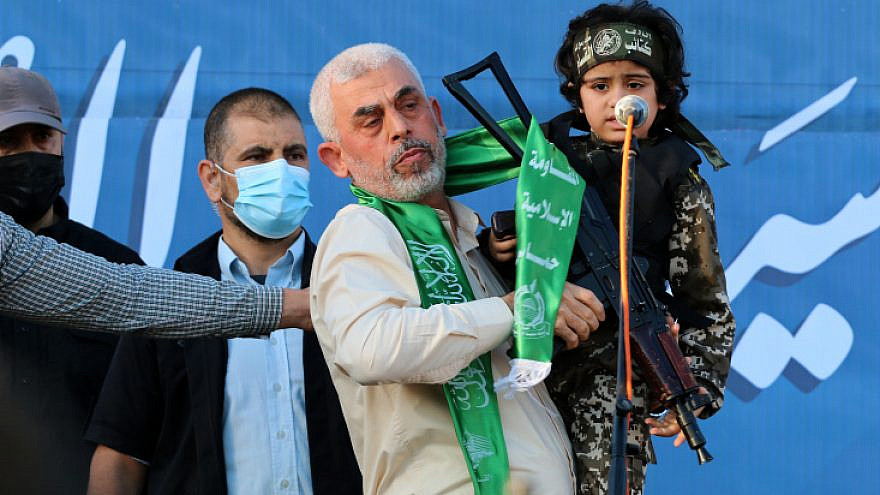Palestinian terrorist organizations in Gaza issued a joint statement on Tuesday calling on Egyptian and international mediators to pressure Israel to “lift the blockade on Gaza, finalize the rehabilitation matter, and stop the provocations in Jerusalem, Sheikh Jarrah and Silwan.”
The terrorist groups also called on Palestinians in Judea and Samaria, Jerusalem and within the Green Line to “prepare for a security escalation.”
“Israel is trying to perpetuate a new equation by pressuring the terrorist organizations in Gaza, and the mediators, by tying all the various issues to one another, including the prisoner exchange, the matter of Gaza’s rehabilitation, fully opening of the border crossings and improving the economic situation,” one source said.
Increasingly, therefore, it appears Hamas is moving toward another military conflict with the Jewish state, particularly amid the repeated threats by the terrorist group’s leader in Gaza, Yahya Sinwar.
Israel Defense Forces Maj. Gen. (ret) Amos Gilad told Israel Hayom that there is a gap between Israel and Hamas with regard to their understanding of the situation, which could lead to another round of fighting with Gaza.
“You need to understand one fundamental thing when it comes to the worldview of Hamas and its leadership in Gaza and abroad; members of Hamas aspire to one thing only and that is Israel’s destruction. They don’t care how many casualties they sustain, how many Gazans get hurt, what damage they incur along the way. Within this reality, Yahya Sinwar himself has a messianic self-perception; he sees himself as the successor to [famed Muslim military commander] Salah al-Din,” said Gilad.
Sinwar considers the 11-day conflict with Israel last month to have been a huge success, Gilad explained.
“From his perspective, he was able to hit all of Israel, rile up the Arabs in Judea and Samaria and also foment rebellion among the Arabs of Israel. Thus, in his distorted view, Hamas finished the campaign with the upper hand and therefore the organization is taking a very tough stance in the negotiations,” he said.
“On the other hand, Israel doesn’t want to destroy Gaza, it wants quiet. Therefore, from its point of view, as long as Hamas isn’t attacking and the residents of Gaza aren’t hungry, the situation is good. And this is the giant gap—Sinwar intends to attack Israel, his warnings are actually serious, while Israel believes Hamas took a significant beating because we hit its defensive tunnels and gained control of the riots on the Temple Mount and across Judea and Samaria and Israel,” said Gilad.
“From the Israeli point of view, Hamas will be hurt much worse if it attacks now, because its [missile] factories are already damaged and it will have a much harder time shooting at us. Here too, however, we can see our perceptual discrepancy compared to Hamas, which is why we must be ready for Hamas to act, even if it doesn’t make sense to us,” he added.
Dr. Yehuda Balanga of the Department of Middle Eastern Studies at Bar-Ilan University, meanwhile, believes Sinwar won’t act too rashly.
“In the immediate time frame, Yahya Sinwar currently has no desire to start a real war with Israel. The Egyptian mediators are in the area as is the United Nations, so Sinwar won’t rock the boat in this situation,” said Balanga.
However, similar to Gilad, Balanga noted that Sinwar is unpredictable.
“We need to keep in mind that Sinwar’s considerations are completely irrational and we can’t truly know how he makes his decisions, but from a practical perspective, Hamas’s immediate interest right now is to avoid conflict.”
In Balanga’s opinion, the situation today is similar to 2006, when Hezbollah leader Hassan Nasrallah attacked Israel and sparked the Second Lebanon War without actually intending to do so.
“Israel isn’t interested in a war for many obvious reasons,” he said. “But we can certainly expect Hamas to test the new Bennett government—launch incendiary balloons and even fire missiles via its proxies in Gaza to see how serious Israel is or isn’t.”
It is precisely within this dynamic, explained Balanga, that an escalation could be triggered due to a misunderstanding by one of the sides.
“Either Hamas will act too forcefully, or Israel will respond in such a manner that leaves Hamas no choice but to retaliate. Essentially, other than [Defense Minister and former IDF chief of staff] Benny Gantz, most of the new ministers are new and lack diplomatic-military experience of this sort,” he said.
“Additionally, the new government wants to prove it is changing the equation against Hamas and is responding harshly to incendiary balloon attacks. In other words, both Hamas and Israel supposedly don’t want to disturb the balance, but the reality itself could lead them to escalate matters,” added Balanga.
IDF Maj. Gen. (res.) Yom-Tov Samia, a former GOC Southern Command, is adamant in his view that Israel should not even engage in talks with Hamas, and instead adopt a far more militant approach toward the organization.
“Hamas is a terrorist organization. As such, Israel must fight it 24 hours a day, seven days a week. There is no place for talks and Israel’s current conduct with Hamas,” he said.
This article first appeared in Israel Hayom.

























